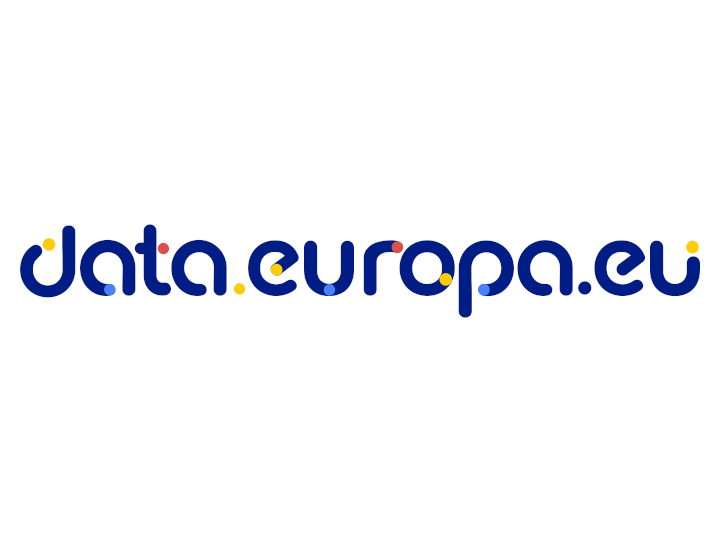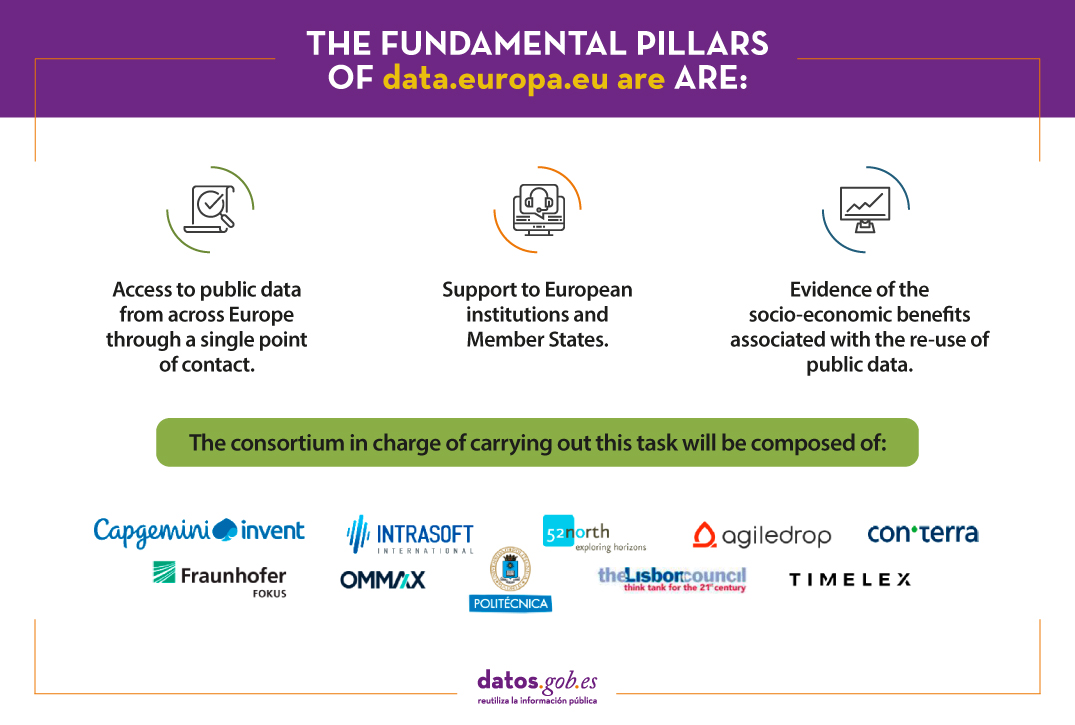
The EU Publications Office has awarded a six-year contract to a consortium including the Ontology Engineering Group of the Universidad Politécnica de Madrid. The aim of the contract is to continue the development of the European Data Portal and to carry out consultancy and research work leading to the new data.europa.eu service.
data.europa.eu: a single access point for data across Europe
Until now, users wishing to locate public sector data related to Europe or member states had two platforms at their disposal:
- The European Union Open Data Portal (EUOPD), which provides access to data from the European Union institutions and other bodies for commercial or non-commercial use; and
- The European Data Portal (EDP), which federates the metadata of public sector information available in the open data portals of European countries. In the case of Spain, the datasets that the different organisations federate with datos.gob.es are automatically federated with the EDP, increasing their visibility at an international level.
The awarded contract aims, among other objectives, at the development, maintenance, operation and evolution of a pan-European data portal infrastructure combining the two current portals under the name data.europa.eu.This service is expected to act as a single point of access to open datasets made available by different publishers, including EU Member States, EU institutions, regional and local authorities, and possibly also NGOs and other international organisations. It will also integrate the EU web archive and resources with persistent URIs of EU institutions and bodies. In this way, it aims to facilitate the publication and re-use of open data across the region.
Continuing the impulse, analysis and assessment of the European open data ecosystem
The consortium's tasks will include fostering the provision of quality data and metadata, as well as promoting the re-use of public sector information across Europe. It will also continue to support the open data community through various actions such as participation in its own and third party events, the organisation of webinars and the production of news, articles and reports on open data developments, best practices and use cases.
In this sense, the consortium will continue to carry out, among others, two of the key studies that the EDP has been developing, such as the following:
- The Open Data Maturity Assessment in Europe. Every year, the European Data Portal publishes the Open Data Maturity Report, which measures the development achieved in the field of open data in Europe. In recent years, Spain has occupied second place in the maturity ranking, positioning itself as a trend-setter in the field.
- The analysis of the socio-economic impact of open data in Europe. The EDP also periodically produces reports in which the benefits of open data are gathered and its value is measured. In the latest edition in 2020, the size of the open data market was estimated at 184 billion euros and was expected to grow to between 199.51 and 334.21 billion euros by 2025.
3 key pillars
In short, the new portal will be based on three main pillars:
- Access to public data from across Europe through a single point of contact. It will offer more than 1 million datasets from 36 countries, 6 European institutions and 79 European bodies and agencies.
- Support to European institutions and Member States through community building, training and consultancy activities to improve, maintain and document good practice in data publishing. Assistance will be provided to those European countries where it is deemed necessary to improve data availability and enhance portals to foster the re-use of public data in each country and community.
- Evidence of the socio-economic benefits associated with the re-use of public data and incentives to encourage and demonstrate the creation of value and use of such data.
Through these pillars data.europa.eu seeks to support the creation and improvement of processes, products and services that reuse public data resources to create economic, social, political and environmental impact.

More information about the Ontological Engineering Group of the Universidad Politécnica de Madrid
The Ontological Engineering Group of the Polytechnic University of Madrid (OEG-UPM) is part of this project through a consortium led by Capgemini Invent, in collaboration with INTRASOFT International, and which also includes other organisations such as Fraunhofer FOKUS, OMMAX, con. terra, 52°North, agiledrop, Timelex, the Lisbon Council, the Universidad Politécnica de Madrid, CapGemini Idean and CapGemini Cybersecurity Services.
The OEG-UPM will work together with other consortium members on several of the studies related to the socio-economic impact of open data, the positioning of the future data.europa.eu in the context of the European Data Strategy, the future European Data Spaces and the European Open Science Cloud. It will also collaborate on the homogenisation of data in Europe to boost interoperability and on understanding the role that citizen-generated data can play in this context.
This Group has extensive experience in the area of open data. It leads the Madrid region node of the Open Data Institute and has collaborated in the design of the open data strategy, development and deployment of various open data infrastructures for several public administrations and non-profit organisations (e.g. the National Centre for Geographic Information, the National Library of Spain, the city of Zaragoza or the Regional Transport Consortium of Madrid). He has participated in the development of technical standards such as UNE 178301:2015 on Smart Cities and Open Data, or the series of technical reports and recommendations for the adoption of open data policies for the Spanish Federation of Municipalities and Provinces, among other actions.
This new contract with the EU is a great opportunity to give visibility to these and other actions in our country. As Oscar Corcho, who leads the team at the Universidad Politécnica de Madrid, says, "The work on this six-year contract will allow us to transfer some of our experiences to the future of open data in the European Union and its Member States".